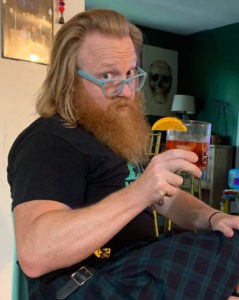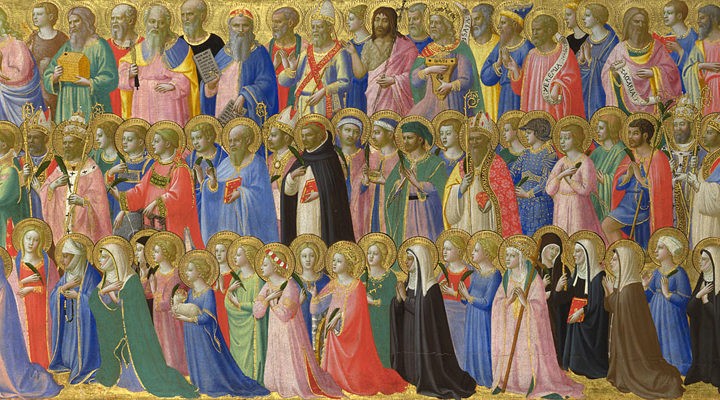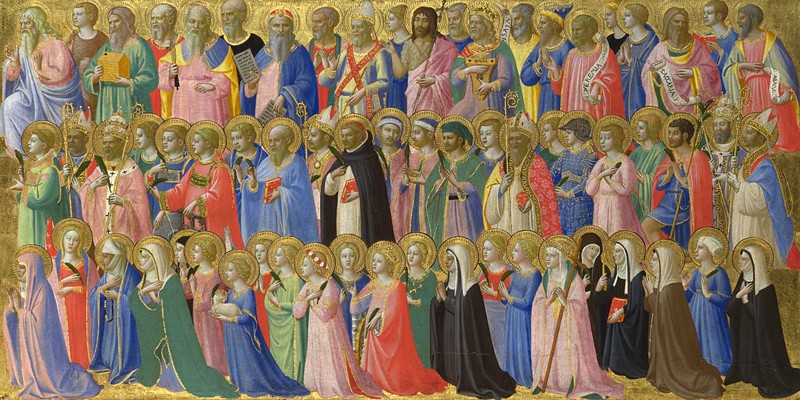Recently, my spouse, daughter and I spent some time with a family in our small village. It was long overdue. A visit we wanted to happen back in early 2020, but you know, the world sort of shut down and whatnot, so we had to backburner the sit-down for 16-plus months.
That afternoon at their homestead went well. The kids played and ran all over the place. Our host made cornbread, while we supplied homemade apple butter. This is the sort of spread I like, as it’s informal and tends to open people up for good conversations. We talked about the food and our families. We asked questions of one another.
One question always seemingly arises in this type of situation.
I have found that when you are a pastor or preacher, folks want to know how you ended up doing what you do. Maybe it’s the called language associated with the role. So sure enough, as we talked of vocations, I was asked how it happened for me.
“When you are a pastor or preacher, folks want to know how you ended up doing what you do.”
I shared some about my educational journey and how it influenced me to become a Baptist. I offhandedly quipped about the sheer number of different kinds of Baptists there are, when one of my hosts asked; “So which one are you? What kind of Baptist are you?”
I wasn’t caught totally off guard. I spat out that I frequent a lot of camps, but I see my denominational home being with a particular sect of Baptists, leaving me in a camp of being a Baptist who’s Southern but not a Southern Baptist. That I’m the kind of Baptist who advocates for women to have rights over their own bodies, and be treated like, well, human beings. I’m also an ally for those in the LGBTQ community, as I see all people made in God’s image. That I try to listen and work, often stumbling, in the pursuit of being an activist for needed conversations about racial repentance and reconciliation.
I stopped there, not sure what else I might say. What else might I disclose to these people?
Pausing then for a moment, I let loose with, “I’ve devoured every book written by and about a renegade Baptist preacher named Will D. Campbell. And while some people have a patron saint, I claim a patron sinner — Anthony Bourdain.”

Justin Cox
Now, If you are a Baptist who’s worth a damn, you’ll know about Will Campbell. And if you don’t, well don’t tell anybody you’re a Baptist until you do. I didn’t expect these neighbors of mine to know about Brother Will, but I figured the name Anthony Bourdain would ring a bell. Especially after I granted him the title of my patron sinner. I imagine I’m in the minority with this one. My guess is there aren’t too many ministers openly claiming a patron sinner. At least not out loud anyway.
I suppose patron saints tend to be more favorable and get a lot more respect, especially around this time of year with All Saints Day looming. Those of the saintly sorts traditionally make the rounds in Christian circles outside the grassroots Baptist faith I find myself in.
There are thousands of saints in the history of the Christian tradition, with patron saints being adopted by nations, cities and groups of people. One explanation offered about the origin of such highly revered persons is that when early Christians were murdered by the empire of the day, locations where those individuals were born, or where they died, would establish them as their patron saints.
Of course, proximity is only one way to adopt a saint. Belonging to a particular guild does the trick too. If you’re a beekeeper, you might turn to St. Ambrose of Milan to get your honey flowing. If you’re a lover of animals and all things ecological, St. Francis of Assisi is your guy. If you take the order of Shakespeare’s Hamlet seriously of “get thee to a nunnery,” look no further than Brigid of Ireland. There are loads of saints for just about any location, occupation or circumstance.
Patron sinners, however, well, let’s say there’s not exactly an official list. I’d never heard of such a thing until I ran across Dan Ivins, the interim minister of the faith community I now serve. Before helping churches during pastoral transitions, Ivins served as pastor of the First Baptist Church of America in Providence, R.I. Yeah, we’re talking about the same church Roger “I-want-religious-freedom-by-God” Williams started. I came to learn that Br’er Dan’s patron sinner was comedian Richard Pryor because even though Pryor cussed at the drop of a hat, he told a lot of truth too.
That got me thinking: Who fits that bill for me?

(Photo: CNN)
Enter Bordain. I first discovered him later in his career when he had made the jump from professional chef to world traveler, journalist and social critic. While working a third-shift factory job in another life, I’d watch Bourdain’s Parts Unknown on the breakroom television. In between eating homemade pinto beans, Krystal burgers or egg salad sandwiches courtesy of the canteen vending machine, I’d watch Bourdain sit and eat with people from all walks of life. He engaged them in conversations that went well beyond the food. In the coming years, I would find Bourdain’s previous projects, including Kitchen Confidential: Adventures in the Culinary Underbelly, a book that put him on the Food Network. I would find others too, Medium Raw: A Bloody Valentine to the World of Food and the People Who Cook, and shows like A Cook’s Tour and No Reservations.
No matter the platform, I found Bourdain relatable. Maybe it was because I had spent a season working in the service industry and knew of the misfit lifestyle often attached to it. Maybe, it was because I knew what it was like to wake up feeling slightly off-kilter after a night of mayhem and debauchery, searching for something to soak up and push down the previous evenings’ Negronis.
Maybe it was his ability to be in a state of constant motion, always on the move and ready to go no matter the location, the image of him walking down alleys at all hours of the night searching for a noodle dish or just someone to connect with for a moment that stuck with me. I, too, have felt that gnawing, that feeling of what if I’m not doing or moving and miss something.
Maybe it was because he didn’t shy away from his flaws but talked about them openly. Not in a chest-pounding way, but a way that conveyed he had learned some important life lessons. He carried scars.
Or maybe it was because I thought he was cool.
I mean the guy could have been an extra in the cult classic The Warriors, easily seen hanging out with Swan and Fox on one of the subway cars heading for Coney Island. His slim silhouette swaggering with the purpose of provocation. His charge for others to be travelers instead of tourists was offensively edgy. More than likely it was a combination of all these things, filtered through sharp and resourceful writing and an on-camera presence that showcased a spirit of restiveness. All these virtues and vices caught my attention.
Yet, it was his willingness to have his world shattered and rebuilt that really awed me.
“It was his willingness to have his world shattered and rebuilt that really awed me.”
There was a Texas Hold ’Em big pot “all-in commitment” to whatever lay before him. Those boundaries-crossing experiences, on the road to Damascus conversions, were nestled right beside the debauchery-filled nights of great food and equally great spirits, the pairing inseparable. No surprise that it was Bourdain who gifted the world with, “Your body is not a temple, it’s an amusement park. Enjoy the ride.”
And while I’m painting a pretty artistic Bohemian picture here, Bourdain also carried a heaviness with him at all times. He openly talked about his previous drug addiction and his struggle with depression. Depression, that constant companion challenging, always suggesting, that happiness just doesn’t feel possible.
Here was a man who saw some of the most spectacular places on the planet but viewed them with doses of both appreciation and unshakable nihilism. Once while filming and basking in the intoxicating scenery of the Greek Islands he quipped, “Is it worse to be someplace awful when you’re by yourself or someplace really nice that you can’t share with anyone?”
The present never seemed enough. He seemed to rush from one experience to the next. Almost as if he was trying to stay ahead of something. Something he had no problem naming.
“Many of his struggles helped me in identifying some of my own.”
Many of his struggles helped me in identifying some of my own. Bourdain wasn’t fully transparent, but he was translucent, and on a good day, that seemed a more achievable scenario to me than trying to be like Billy Graham. I appreciated his words before his passing by suicide in 2018. I’ve come to see some of those same words as forms of prayer since then.
“If I’m an advocate for anything, it’s to move. As far as you can, as much as you can. Across the ocean, or simply across the river. The extent to which you can walk in someone else’s shoes or at least eat their food, it’s a plus for everybody. Open your mind, get up off the couch, move.”
His words remind me that when I go and travel, when I set about meeting new people, let me do so not with the intent to change others, but instead to be changed by them. That’s a much more holy place to be. It’s a much more sacred space to occupy. It’s the work of the saints. Many of which just happen to be beautiful sinners as well.
And that’s just it, there’s not much difference between sinners and saints. Oscar Wilde famously wrote that “the only difference between the saint and the sinner is that every saint has a past and every sinner has a future.”
I’ve heard it said in other ways too. My favorite being from a parishioner in my first church who would finish every prayer with a plea for God to be with “us saints who are still under construction.”
Oscar Wilde famously wrote that “the only difference between the saint and the sinner is that every saint has a past and every sinner has a future.”
This All Saints Day, the church I serve will come together to remember those in our community who passed. We will ring the church bell and say the names of those we loved. We’ll light candles and we’ll remember. We’ll also bring items to sit on our altar table, items that speak of a person who has gone on ahead of us, but who has helped us along on our faith journeys. Folks will get a chance to share why they brought the items they did. They’ll get a chance to talk of the saints and sinners who changed their lives.
I plan to bring the bowls that belonged to my maternal grandmother. The same bowls that she served our family chili beans in when I was young. I’ll set them on the altar table and give thanks for her impact on my life as she was certainly a saint.
I’ll place beside them a copy of one of Bourdain’s books, and I’ll share with those gathered what his words meant to me and how they made my faith and image of God bigger while encouraging me to love my neighbor. I’ll call him my patron sinner knowing full well it’s more wonderfully complicated than that. That’s just the kind of Baptist I am. I count the sinners right along with the saints.
Justin Cox serves as senior pastor of the United Church of Lincoln, Vt. He received his theological education from Campbell University and Wake Forest University School of Divinity. He enjoys reading, amateur gardening and helping his spouse, Lauren, chase their daughter, Violet, all over the village of Lincoln. He is an ordained minister affiliated with the Cooperative Baptist Fellowship and is currently enrolled in the doctor of ministry program at McAfee School of Theology.
Related articles:
Seven Reasons Why Christians Should Celebrate ‘Halloween’ | Opinion by Alan Rudnick
All Saints Day and every day: the ‘dangerous, restless speech’ and revolutionary act of lament | Opinion by Laura Mayo
For all the saints | Opinion by Matthew Johnson


